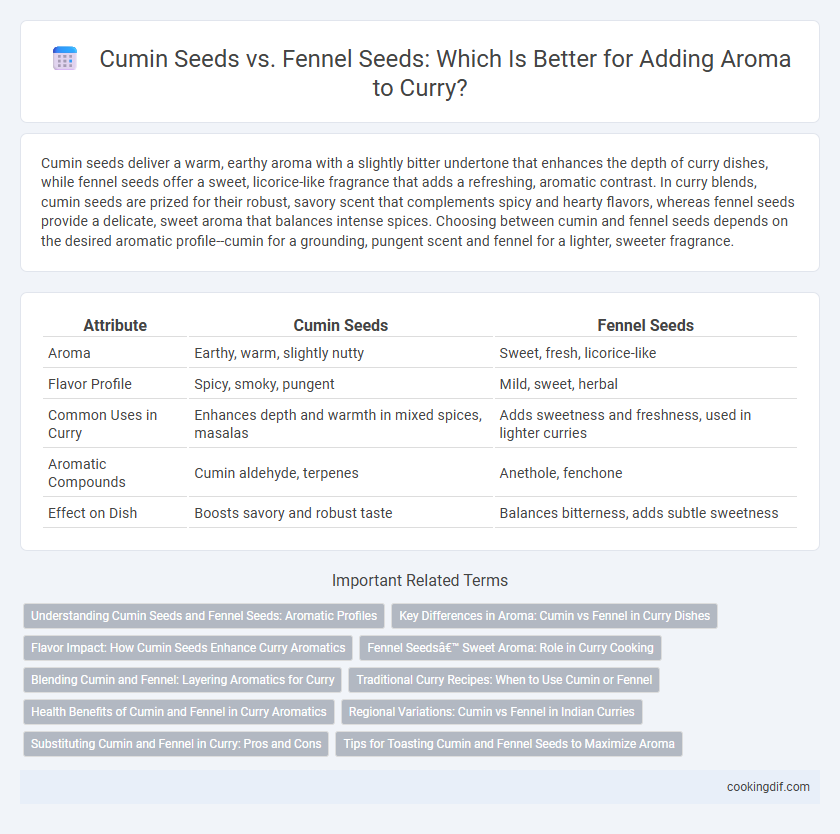Cumin seeds deliver a warm, earthy aroma with a slightly bitter undertone that enhances the depth of curry dishes, while fennel seeds offer a sweet, licorice-like fragrance that adds a refreshing, aromatic contrast. In curry blends, cumin seeds are prized for their robust, savory scent that complements spicy and hearty flavors, whereas fennel seeds provide a delicate, sweet aroma that balances intense spices. Choosing between cumin and fennel seeds depends on the desired aromatic profile--cumin for a grounding, pungent scent and fennel for a lighter, sweeter fragrance.
Table of Comparison
| Attribute | Cumin Seeds | Fennel Seeds |
|---|---|---|
| Aroma | Earthy, warm, slightly nutty | Sweet, fresh, licorice-like |
| Flavor Profile | Spicy, smoky, pungent | Mild, sweet, herbal |
| Common Uses in Curry | Enhances depth and warmth in mixed spices, masalas | Adds sweetness and freshness, used in lighter curries |
| Aromatic Compounds | Cumin aldehyde, terpenes | Anethole, fenchone |
| Effect on Dish | Boosts savory and robust taste | Balances bitterness, adds subtle sweetness |
Understanding Cumin Seeds and Fennel Seeds: Aromatic Profiles
Cumin seeds deliver a warm, earthy aroma with nutty and slightly peppery undertones that intensify the depth of curries, enhancing savory richness. Fennel seeds offer a sweet, licorice-like fragrance with subtle hints of anise, contributing a refreshing and mildly herbal note to aromatic blends. Selecting between cumin and fennel seeds influences the curry's aromatic profile by balancing warmth and sweetness to achieve desired flavor complexity.
Key Differences in Aroma: Cumin vs Fennel in Curry Dishes
Cumin seeds emit a warm, earthy aroma with spicy and nutty undertones, enhancing the depth and richness of curry dishes. Fennel seeds, in contrast, offer a sweet, licorice-like fragrance that brightens and adds a subtle freshness to curries. The key difference in aroma lies in cumin's robust, smoky scent compared to fennel's light, herbal sweetness.
Flavor Impact: How Cumin Seeds Enhance Curry Aromatics
Cumin seeds deliver a warm, earthy aroma that deeply enhances curry dishes by adding a robust, nutty flavor profile. Their slightly bitter and peppery notes create a complex base, intensifying the overall spice blend and complementing other ingredients like coriander and turmeric. Fennel seeds, in contrast, offer a sweet, licorice-like fragrance that lightens curry aroma but lacks the grounding depth cumin provides.
Fennel Seeds’ Sweet Aroma: Role in Curry Cooking
Fennel seeds contribute a uniquely sweet and licorice-like aroma that enhances the overall fragrance profile of curry dishes, differentiating them from the earthy, warm notes provided by cumin seeds. Their volatile oils, particularly anethole, release a subtle sweetness that balances spicy and savory flavors, making fennel seeds essential in spice blends like garam masala and certain regional curries. Using fennel seeds can elevate the depth and complexity of curry aroma, offering a refreshing contrast to cumin's robust and pungent scent.
Blending Cumin and Fennel: Layering Aromatics for Curry
Blending cumin and fennel seeds in curry creates a complex aromatic profile, with cumin providing a warm, earthy base and fennel adding a sweet, licorice-like freshness. The synergy of these spices enhances depth, balancing savory and slightly sweet notes that elevate the overall flavor complexity. Properly toasting both seeds releases essential oils, intensifying their fragrance and ensuring a robust, layered aroma in the curry.
Traditional Curry Recipes: When to Use Cumin or Fennel
Cumin seeds provide a warm, earthy aroma essential in traditional curry recipes like garam masala and lentil dals, enhancing depth and a slightly bitter undertone. Fennel seeds offer a sweet, anise-like fragrance preferred in curries from regions like Rajasthan and Bengal, balancing spicy heat with a refreshing flavor. Use cumin seeds for savory, robust profiles and fennel seeds when a mild, aromatic sweetness complements the dish.
Health Benefits of Cumin and Fennel in Curry Aromatics
Cumin seeds are rich in antioxidants and possess anti-inflammatory properties that aid digestion and boost immunity, making them a potent aromatic in curry blends. Fennel seeds contribute fiber, vitamins, and minerals, promoting digestive health and reducing bloating while enhancing the curry's flavor profile with a sweet, licorice-like aroma. Both seeds offer unique health benefits that complement each other, improving gut health and overall wellness when used together in curry aromatics.
Regional Variations: Cumin vs Fennel in Indian Curries
Cumin seeds provide a warm, earthy aroma and are predominantly used in North Indian curries, adding depth and a slightly bitter undertone that complements robust spices. Fennel seeds offer a sweet, licorice-like fragrance common in South Indian and Gujarati curries, enhancing flavors with a subtle sweetness and refreshing finish. Regional variations in Indian curries showcase cumin as a staple spice for savory richness, while fennel is favored for balancing pungency with its aromatic sweetness.
Substituting Cumin and Fennel in Curry: Pros and Cons
Cumin seeds impart a warm, earthy aroma with a slightly bitter undertone, enhancing the depth of curry dishes, while fennel seeds offer a sweet, licorice-like fragrance that adds a refreshing note. Substituting cumin with fennel alters the flavor profile by introducing sweetness instead of cumin's pungency, which may suit lighter curries but overwhelm robust ones. Using fennel instead of cumin risks diminishing the traditional spicy warmth, so balancing quantities or combining both can achieve a harmonious aromatic complexity.
Tips for Toasting Cumin and Fennel Seeds to Maximize Aroma
Toasting cumin seeds releases essential oils, enhancing their warm, earthy aroma, while fennel seeds develop a sweet, licorice-like fragrance when heated. Heat a dry pan over medium heat, add the seeds, and stir continuously for 1-2 minutes until they become fragrant and slightly darker. Avoid over-toasting, as burnt seeds produce a bitter taste that can overpower your curry's flavor profile.
Cumin seeds vs Fennel seeds for aromatic Infographic

 cookingdif.com
cookingdif.com